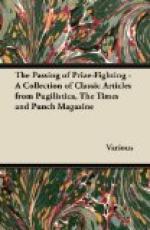Vainly on Fashion you make war, With querulous Book, and quaint Bazaar, Good Ladies of the Higher Light! A Turkish Tea-gown, loose or tight, Won’t win us to the Rational Cult; Japanese skirts do but insult Our elder instincts, to which Reason Is nothing more nor less than treason. Your “muddy weather costume” moves us No more than satire, which reproves us Ad nauseam, and for whose rebuff We never care one pinch of snuff. No, Ladies HARBERTON and COFFIN. Your pleading, like the critics’ “scoffin” Touches us not; have we not smiled, Mocking, at Mrs. OSCAR WILDE? And shall we welcome with delight Queer robes that make a girl “a fright?” Pooh-pooh! We’re simply imperturbable, The Reign of Fashion’s undisturbable. The “Coming Dress?”—that’s all sheer humming, We only care for Dress be-Coming!
* * * * *
MODERN TYPES.
(By Mr. Punch’s Own Type Writer.)
No. XXV.—THE ADULATED CLERGYMAN.
The Adulated Clergyman possesses many of the genuine qualities of the domestic cat, in addition to a large stock of the characteristics which tradition has erroneously assigned to that humble hut misunderstood animal. Like a cat, he is generally sleek and has become an adept in the art of ingratiating himself with those who wear skirts and dispense comforts. Like a cat, too, he has an insinuating manner; he can purr quite admirably in luxurious surroundings, and, on the whole, he prefers to attain his objects by a circuitous method rather than by the bluff and uncompromising directness which is employed by dogs and ordinary honest folk of the canine sort. Moreover, he likes a home, but—here comes the difference—the homes of others seem to attract and retain him more strongly than his own. And if it were useful to set out the points of difference in greater detail, it might be said that the genuine as opposed to the traditional cat often shows true affection and quite a dignified resentment of snubs, is never unduly familiar, and makes no pretence of being better than other cats whose coats happen to be of a different colour. But it is better, perhaps, at once to consider the Adulated Clergyman in his own person, and not in his points of resemblance to or difference from other animals.
[Illustration]
He who afterwards becomes an Adulated Clergyman has probably been a mean and grubby schoolboy, with a wretched but irresistible inclination to sneak, and to defend himself for so doing on principle. It is of course wrong to break rules at school, authority must be respected, masters must be obeyed, but it is an honourable tradition amongst schoolboys that boys who offend—since offences must come—should owe their consequent punishment to the unassisted efforts of those who hold rule, rather than to the calculating interference of another boy, who, though he may have shared the offence, is unwilling to take his proportion of the result. A sneak, therefore,




